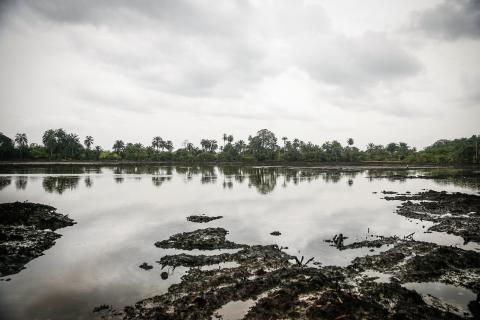Warrior Lawyer Profile: Chima Williams

Scarlett McGourlay
Allard Exchange Student 2022-2023, LLB Candidate University of Glasgow
Jul 14, 2023
The Nigerian Lawyer Who Took on Big Oil – And Won
The Niger Delta region of Nigeria is home to some of the world's largest oil reserves. Consequently, it has been swarmed by profit-hungry multinational oil companies and persistently impacted by catastrophic oil spills. The extent of the problem is not entirely clear even today, but 2011 reports from Shell suggest they alone spilled at least 17.5 million litres of oil in the region. Damaged and old infrastructure, a lack of political will, and the consistent impunity of multinational oil companies has allowed this devastation to continue for decades. But in 2008, one phenomenal environmental lawyer took the first step to disrupting it all.

From small beginnings to great success
Chima Williams changed the fate of the Niger Delta region when he took action against the oil giant Shell in 2008. The story of his success starts with simple beginnings. As a student in the 1990s, Williams began to develop his interest in environmental activism. He volunteered at the Nigerian NGO Environmental Rights Action and founded a student environmental assembly at his university. Soon after, Williams completed law school and so began his journey to save the Niger Delta.
Though Williams himself was not initially aware of the devastation caused by spills in the region, he was approached in 2004 by a farmer who lived in a village which had been almost entirely destroyed due to a leaking pipeline owned by the Nigerian subsidiary of Shell. The farmer asked “Can you do this case for me?” Williams began immediate research into the spills. He learned of the corroded pipelines, the fires that had burnt through villages, the devastated ecosystems. He concluded that he would take the case.

While completing legal research on the matter, Williams also personally gathered evidence of Shell’s wrongdoings, completed interviews and created a team of international legal assistants to support him with the case. It was during this preparatory time that it became clear to Williams that suing Shell for their negligence in Nigerian courts could be futile. As he explained at the Green Rights and Warrior Lawyers Virtual Academy in 2022, “The problem is not getting justice from the [Nigerian] courts, the problem is enforcement of favourable judgements [made in Nigeria]”. In the same talk, Williams explains that the Nigerian executive previously failed to enforce legal judgments against multinational oil companies despite the fact that the rulings would have been greatly beneficial to Nigerian citizens. Therefore, in 2008, Williams decided, with the help of Friends of the Earth Netherlands, he would instead sue Shell and its Nigerian subsidiary in Shell’s home jurisdiction: the Netherlands.
Suing Shell
After carefully considering this jurisdictional issue, Williams and his team prepared the case, gathered swathes of evidence and travelled to the Hague. After 5 years of preparation, the team presented their case at the District Court of the Hague only to face a ruling that denied the communities they were working with any remedy. The court found that Shell could not be liable for their Nigerian subsidiary or the oil spills in the villages of Goi and Oruma. Undeterred by this setback, Williams pushed on, launching an appeal.
It was Williams’ tenacity and unwavering commitment to the communities he represented that landed the case in the Hague Court of Appeal almost a decade after the first ruling. In 2021, after thirteen arduous years of litigation, Chima Williams finally saw success. The Court ruled that Shell’s Nigerian subsidiary was responsible for four of the six pipeline leaks that were being analyzed during the lawsuit. In addition to finding the subsidiary company liable for some of the oil pollution in the region, the court added that the parent company – Shell – had violated a duty of care. The company had not done enough to manage or clean up the pollution caused by its subsidiary.
This was revealed only when evidence – previously hidden by Shell – was unearthed by Williams and brought to light during the hearing. This new evidence proved that the infrastructure being used in the region was outdated and unsuitable. The court ordered the Nigerian subsidiary of Shell to pay damages to the community members impacted by the spills and to carry out an intensive clean-up operation. In December, 2022 the parties reached a settlement in which Shell will pay 15 million euros to affected communities.
This is the first time the oil giant Shell has been sued successfully in its home jurisdiction for harms suffered abroad, paving a route to justice for all communities affected by their negligence.
This short story of success shows just a fraction of Chima Williams' legal endeavours. From the beginning of this battle Williams showed he was not willing to give up. Even in the face of setbacks, he and his team persisted. They achieved justice for the forgotten communities of Goi and Oruma. His humble beginnings in student activism launched him into something far greater – a takedown of a multi-national oil giant, for which he has been internationally recognized. In 2022, Williams won the Goldman Environmental Prize for his work on behalf of the communities in the Niger Delta. Williams continues to practice as an environmental lawyer in Nigeria and hopes to use his knowledge to assist those challenging the destructive practices of extractive industries. As he told a journalist in 2022:
Learn more about Chima Williams and his work by watching his talk at the First Annual Green Rights & Warrior Lawyers Virtual Academy, November 10, 2022.
- Centre for Law and the Environment

